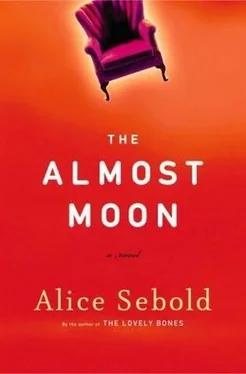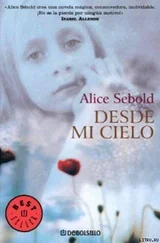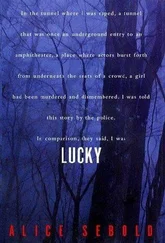“But why did he come to see you?”
It rang in my head: I never wanted the divorce.
“I’m not sure yet,” I said. I held the cup of hot coffee in my hands and pretended I was warming them up. When Natalie looked at me, a certain lifelong look that said “You’re not telling me the whole story,” I could feel the shakes start where my elbows met the table. A second later, I had spilled the full and scalding cup.
Natalie stood up from the booth. The coffee had gotten on the sleeve of her dress, but most lay pooling on the table or seeping into my jeans. I did not move. I felt the hot water burning my thighs. It felt right to me. I saw the clock across the room. It was 9:55.
“Time to go to class,” I said. I heard it in my voice. It was suddenly flat. I had always told Natalie everything, and now, within twenty-four hours, I had done more, I saw, than it might be possible to repair between even the oldest of friends.
Briefly I thought about what it would be like if I asked Natalie to come with me somewhere, to go away together, move to another city, maybe open the clothing store she had always dreamed of. She was adjusting her dress and daubing off the coffee from where it had splashed onto the outside of her purse. “Remember riding bikes together?” I wanted to ask. “Remember that nerdy guy who lived on your corner and had a bell on his handlebars? How he used to ring it all the time?” I thought of having seen Mr. Forrest that morning. And suddenly saw Mrs. Castle talking to the police, her arms arching in the air as she spoke. Had I seen that? Or had she been calmly talking to them? Were they taking notes? Or just listening to her talk? I tried to remember the number of police cars that had been there. Two on my mother’s side of the street and one around the corner. The coroner’s van and the ambulance that had pulled up to Mrs. Leverton’s. I could call the hospital to find out what was wrong with her, but Jake wouldn’t approve of that. It would tip my hand.
“He’s really gotten to you,” I heard Natalie say.
I looked up at her. My vision was fuzzy around the edges, and her voice suddenly seemed a long way off.
“Well, it’s time to go get nude,” she said. She was reaching for my hand. We had said this phrase to each other for fifteen years.
“Yes,” I said.
“I’m leading you, woman,” she said, “and we are going to sit down after this and talk men. I’ve got some news of my own.”
This helped. It made me feel good that Natalie planned to tell me about the contractor. It was what I used-that still-to-come confidence of my friend-to make my legs work and stand up.
We walked from the student union, down the sloping asphalt pathway that led from it to what was commonly called the Art Hut. I had never understood this nickname because, more than anything else, the building itself looked like a failed attempt at an industrial office complex. One that had never gotten past the first two floors and then had been cruelly sheared off and roofed with a patchwork of composite and tar. Inside, however, were the huts. Dark, warm corners in the large studios, where many of the art adjuncts would spend the night, as the conditions in the art building were often better than the places they rented in the surrounding neighborhoods-especially as winter came on. In the Art Hut, you could crank up the heat, and the bill went to the university. As we were walking through the doors and up the three stairs to the first-floor hallway, I thought that maybe I would come and live in the art building. Surely there had to be a blanketed warren to spare. What I hadn’t quite put together yet was that I was already churning. Half of my mind had now begun to plan an escape.
I saw Natalie retreat with a wave into Room 230-the Warm Room. I thought it was unfair that Natalie so often lucked out and got assigned to it, and had wondered if there was a silent favoritism shown toward my friend on the part of the room assigners at the start of every semester. I could see why. Neither Gerald, the other model, nor I brought muffins or wine over to the administrative offices. We never put Halloween pencils, with erasers shaped like counts or pumpkins or ghosts, in the secretary’s mailbox.
Gerald, I suddenly thought, was someone I did not want to see. He had lost his mother in a fire the previous year. She had gone to bed and left a cigarette lit, and the next thing Gerald knew he was falling to the floor and gasping for air. He barely got out alive, and his mother, they said, was dead from the smoke before she burned. Since then, when I ran into him, he would say, “My mother died,” in the middle of talking about the weather or about what poses we were doing for various classes. Natalie had always thought he was a little dim-witted, and this new habit seemed finally to have confirmed it, but as I walked down the hall to my own classroom, all I could think of was his genius. How did the firemen know it was her cigarette left burning on the bedside table?
“Hi, Helen. You look great!” one of the students greeted me. She was a girl named Dorothy, the best student in the class even if also an insufferable suck-up.
I could feel one or two other students take note of me then. They were adjusting their easels, which were battered and stained from years of undergraduate use.
I made my way to the three-panel screen, behind which I dressed or undressed. I noted only vaguely what was set out on the platform or pinned to the curtain that lay to its rear. There was a basin. There was a washcloth and comb. And on the curtain there was a large picture of an old-fashioned bathtub. It barely made an impact. I thought, Bathtub, and then I stepped behind the screen and sat down on the painted black wooden chair to take off my shoes and find my bamboo flip-flops to place on the floor.
Just as I had clung to the idea that Natalie was planning to tell me about the contractor, I now was helped along by the sharp scent of bleach coming off the former hospital gown hanging from a metal hanger on the back of the screen. The woman who did the laundry for the art building was afraid, Natalie and I both thought, of live-model disease. As a result, she used so much bleach that it quickly ate through the gowns we used and left them as thin as tissue paper after a very short time. But the scent of her fear, made palpable in the bleach, served to startle me to my task. I heard Tanner Haku, a Japanese printmaker who had ended up in Pennsylvania after twenty years of teaching around the globe, enter the room and greet his students. He began talking to them about individual style in the depiction of the nude.
I took my sweater off over my head and shoved it in the small hutch beneath the window beside me. I placed my shoes in the hutch below. I sat in the chair in my mother’s slip and my black jeans. On the other side of the screen, I heard Tanner Haku quoting Degas: “Drawing is not form; it is the way we see form.”
But he did not credit Degas. If he credited Degas, he would have to explain who Degas was and what Degas meant to him personally. It would be that much more of his soul he would have to sacrifice to the classroom.
I unbuttoned my jeans and stood to take them off.
“That doesn’t make sense,” I heard the reed-thin voice of a boy say.
I could feel the thud to Haku’s chest. After this many years, even though I was only the model, I could usually feel the thud to mine. But this boy’s confident assertion in the face of a hundred years of history made no impact on me now. In a way it made me see that no matter what happened, things would go on just as they had been, with or without me. Gerald would come, and he would say, “My mother died,” and the students would nod uncomfortably, but he would stand on the platform, and they would do slightly altered assignments- Man on a Pedestal instead of Woman at the Bath -and then they would turn them in and Tanner would listlessly grade them as he blasted opera and drank gin.
Читать дальше












